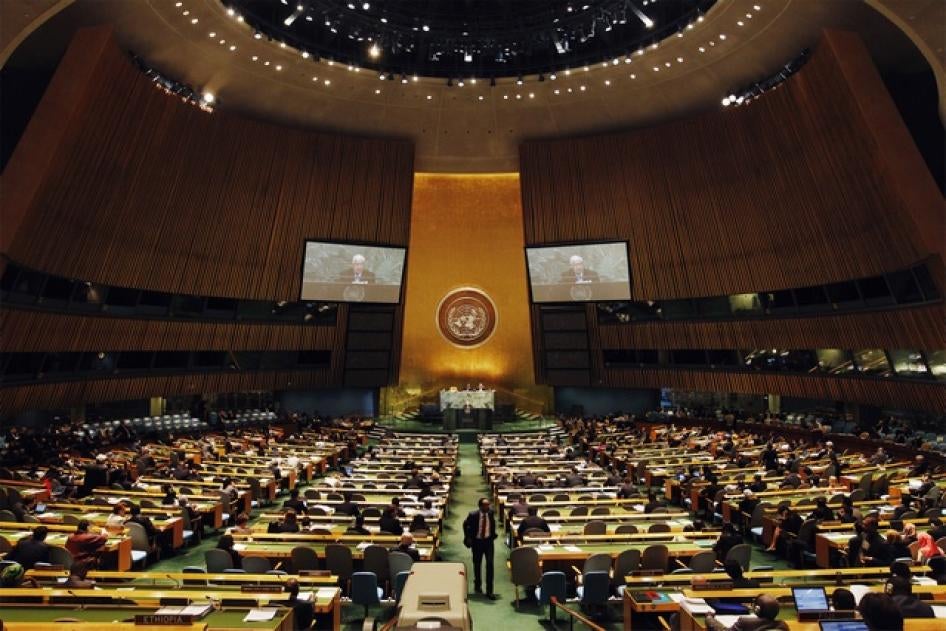(New York) – Governments should ensure that their laws criminalizing membership in foreign terrorist groups meet the human rights standards laid out in a new United Nations report. The Working Group on Mercenaries, in a report to the UN General Assembly on November 2, 2015, said that recent laws “disproportionately restrict” human rights and “unnecessarily expand” surveillance powers.
“Countries should heed the working group’s concerns and prevent their foreign terrorist fighter measures from becoming tools of repression,” said Letta Tayler, senior terrorism and counterterrorism researcher at Human Rights Watch. “Infringing on fundamental rights and freedoms is not the way to keep people safe.”
The working group examined the recent worldwide surge of foreign nationals joining armed extremist groups, particularly in Iraq and Syria. Much of its report assesses the impact of laws and policies enacted in response to UN Security Council Resolution 2178 of September 2014, which requires all UN member countries to “establish serious criminal offenses” for citizens who travel or seek to travel abroad to become “foreign terrorist fighters.”
“States have adopted measures that disproportionately restrict freedom of movement and the right to nationality, due process and the presumption of innocence,” the working group report said. At risk are “otherwise lawful, non-violent activities of groups or individuals.”
Many government measures also “unnecessarily expand powers for emergency surveillance, arrest, detention, search and seizure,” jeopardizing the rights to privacy and due process, the working group said. It added that some laws fail to distinguish between foreign fighters who may be engaged in lawful conduct and those who commit terrorist acts.
Resolution 2178 contributes to this “misapplication” by not explaining what it means by “terrorism” or “terrorist,” terms for which no universal legal definition exists, the UN group said. The absence of agreement on such terms lets countries apply vague or overly broad definitions to acts and groups that “violate the principle of legality.”
The Security Council resolution, drafted primarily by the United States, names three groups – the Islamic State (also known as ISIS); Al-Qaeda; and its affiliate, Al-Nusra Front – but otherwise leaves it to governments to interpret whom they should target. It also requires member countries to criminalize recruitment and funding for foreign terrorist organizations, to share intelligence on suspected foreign terrorist fighters, and to create programs to prevent violent extremism.
At least 34 countries have enacted foreign terrorist fighter measures since 2013 that contain one or more overbroad provisions, most in response to Resolution 2178, Human Rights Watch has found. Troubling provisions authorize arbitrary travel bans and confiscation of passports or identity cards, prolonged detention without charge or trial, prosecutions in closed proceedings, and – in the United Kingdom – stripping citizenship from naturalized citizens, even if this leaves them stateless.
The UN working group expressed concern that foreign terrorist fighter measures may hinder humanitarian assistance in conflict zones by failing to exempt travel for doctors and other life-saving aid workers. Resolution 2178 does not advise governments to carve out humanitarian aid exemptions when criminalizing foreign travel.
An October report by Harvard Law School’s Program on International Law and Armed Conflict found that only four of 25 countries it studied – Australia, Canada, New Zealand, and the US – explicitly excluded one or more forms of humanitarian aid from their counterterrorism measures. The Harvard report and Human Rights Watch have found some of these exemptions to be insufficient.
UN bodies, including the Security Council Counter-Terrorism Committee, have repeatedly warned that counterterrorism measures that do not fully respect human rights and the rule of law are drivers of violent extremism, the working group noted. It called on national governments and the international community to “make every effort” to integrate human rights protections into foreign fighter initiatives. The working group also singled out the need for precise definitions of terms such as “foreign fighter” and “terrorism.”
To assist that process, the Security Council should require that definitions of “terrorism” and “terrorist acts” used by governments to implement counterterrorism mandates such as Resolution 2178 are fully consistent with international human rights, refugee, and humanitarian law, Human Rights Watch said. Such definitions should, for example, exclude acts that lack the elements of criminal intent to cause death or serious bodily injury or the taking of hostages.
“The Security Council should promptly address dangerous flaws in Resolution 2178 that can backfire and cause considerable harm,” Tayler said. “The United States, as the resolution’s chief sponsor, should lead the way in ensuring that the council doesn’t encourage abusive tactics.”








